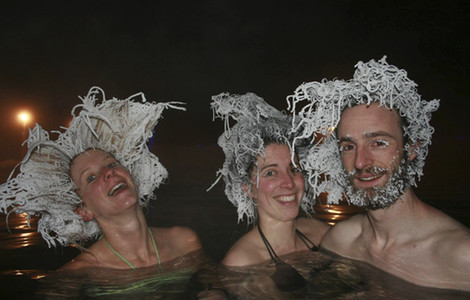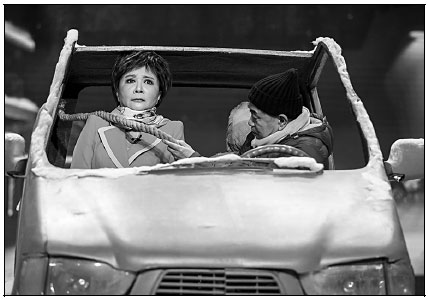Popular TV show not so funny business
Updated: 2015-03-05 07:48
By Han Bingbin(China Daily USA)
|
||||||||
The annual CCTV New Year Gala experienced a small drop in ratings this year, amid growing criticism some skits were highly offensive to disabled people, women and the southern Chinese.
The number of live viewers dropped below 700 million for the first time in a decade.
Socially aware Chinese viewers were angered by some content in the gala that they have accused of reinforcing discriminatory ideas, especially against women.
This growing dissatisfaction led to a feminist group to write an open letter to the country's top media regulator, demanding apology from CCTV while requesting as many as eight skits from the gala to be prohibited from ever airing again. However, they have not received any response from the TV station.
In one of the most criticized skits, a "nyuhanzi", literally meaning "masculine woman", had her life compared with that of a tall slender "goddess" to highlight the sad fact that she was ordinary-looking and still single at the age of 30. Another controversial skit suggested female officials exchange sex for promotions. The skits have also been accused of discrimination against short people, South China accents and the elderly.
The open letter started a heated discussion on micro-blogging site Sina Weibo. An online poll on Sina Weibo, in which 30,000 people voted, showed that 85 percent of people found that the gala is discriminatory. However, another poll launched by entertainment portal Netease.com, polled 33,591 people, showing that more than 69 percent of them believed the so-called discrimination is "over-stated".
"People's awareness of discrimination needs to be raised. They are used to it. I can understand that," says Lyu Pin, a well-known female rights activist who initiated the open letter protest.
"In such a situation, we need to bring to light the duty of institutions like CCTV. They've made people more indifferent to discrimination by presenting it as something to laugh at."
The New Year gala and Chinese television shows in general have long relied on making fun of physical disability and the disadvantaged for laughs.
The stereotypical image of people from Southern China being snobbish businessmen was also reinforced in the gala, which featured characters speaking with noticeable Southern accents. Some even find the annual gala stating that eating dumplings is the most important New Year tradition is discriminatory, because at least half of China (the South) do not eat dumplings on New Year Eve.
"It's normal to see prejudice in everyday life. But as a major platform, what CCTV chooses to recreate and spread will be strengthened in people's minds," says Lyu.
However, critic Qin Ning writing in the Beijing Times, argues that an artistic image doesn't speak for the value orientation of a whole program, let alone that of the whole gala. He believes the mocking of disadvantaged social groups in the gala was purely for fun and meant no harm.
"If people who discriminate against women exist in life, then art that reflects this should be tolerated," Qin writes.
Critic Cheng Zhenwei however believes there is no way CCTV is oblivious to "gender discrimination" and its choice of such programs is decided by its target audience. In a commentary he wrote on Wuhan-based cnhubei.com, he states that considering it's massive reach, the gala has to consider how its humor will work for less educated audiences.
The kind of humor that's relatively light and easier to digest often makes use of elements like physical appearances, gender and regional accents that don't require much thinking, he writes.
After all, unlike United States pop culture that is fully mature and is able to consider the more delicate and subtle needs of the society, Chinese pop culture is still in the phase of "extensive development" and not ready to take itself so seriously, says film and TV critic Li Xingwen to China Daily.
Comedy in China already faces many limitations, and artists sometimes find it's easier to use disadvantaged groups as a comic element, Li says.
The rise of audiences' social awareness means they have started to want different types of comedy, says Cheng in his commentary. Chinese audiences' taste in entertainment has also evolved through being exposed to international programs, he says, and therefore the gala needs to update itself in terms of humor.
The good news is, social media and big data mining tools have allowed TV stations to easily detect the changes in audience needs, says Du Zezhuang, founder and analyst with media consultancy Ze Media.
For example, Du adds, many TV shows used to make fun of disabled people, but as dissenting voices grew stronger through social media, such programs have started to fade away.
"There should be more discussion. TV stations should stay open to the supervision of the audience," says Lyu, the female rights activist.
"We believe audiences are able to voice different opinions. The point is whether these opinions can be accepted by the TV makers."
hanbingbin@chinadaily.com.cn
|
Cai Ming (left) and Pan Changjiang perform a controversial skit on CCTV's 2015 New Year Gala. Chun Yuan / CFP |
(China Daily USA 03/05/2015 page9)

 Seven things you may not know about Lantern Festival
Seven things you may not know about Lantern Festival
 Top 10 destinations for Chinese tourists
Top 10 destinations for Chinese tourists
 Floods displace over 2,000 in Brazil
Floods displace over 2,000 in Brazil
 New sports cars debut Geneva motor show
New sports cars debut Geneva motor show
 People celebrate upcoming Lantern Festival across China
People celebrate upcoming Lantern Festival across China
 Chinese investors take bite of Big Apple
Chinese investors take bite of Big Apple
 Intl Hair Freezing Contest winners announced
Intl Hair Freezing Contest winners announced
 Volcano Villarrica erupts in southern Chile
Volcano Villarrica erupts in southern Chile
Most Viewed
Editor's Picks

|

|

|

|

|

|
Today's Top News
China faces 'formidable challenges', says Li
GDP target drops to 7%
US ambassador to S.Korea attacked
China defends military items on ship
China refutes US concern over security
China could pass US in electric-car market: expert
China's defense budget to rise about 10%
Netanyahu assails Iran-nuclear talks
US Weekly

|

|








